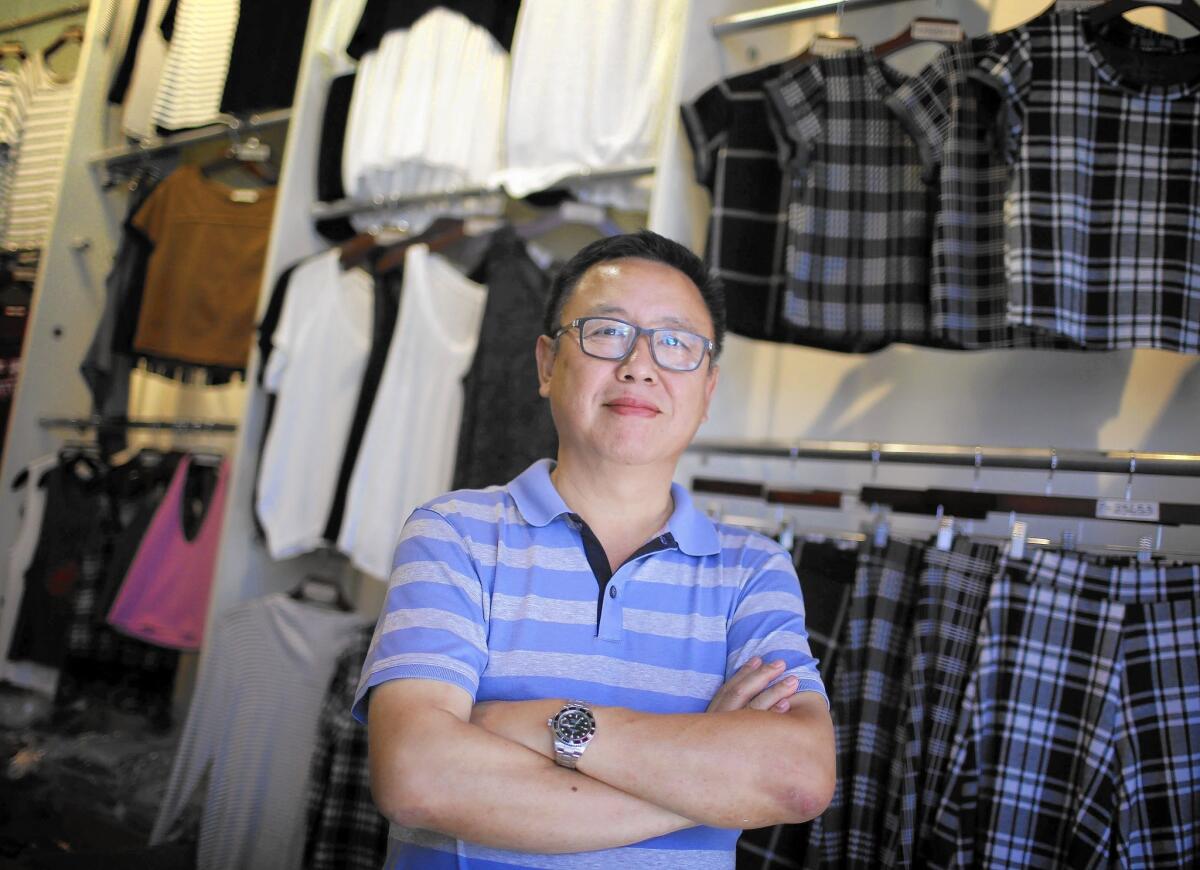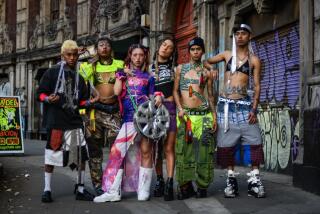The fight to keep Korean businesses in L.A.

When Daejae Kim arrived in Los Angeles three decades ago, he took his first step into the apparel business in downtown’s fashion district, where a budding Korean entrepreneurial community was beginning to take hold.
His wife got a job as a store clerk. He peddled textiles. Eventually, they built their own wholesale and manufacturing business selling trendy women’s clothing.
Today, Korean businesses represent at least a third — and possibly half — of the businesses in the garment district, generating at least $10 billion in annual revenues and providing 20,000 jobs, according to the Korean American Apparel Manufacturers Assn.
And now Kim and other Korean American clothing makers are eyeing a new frontier.
Squeezed, they say, by Los Angeles’ rising minimum wage, stricter labor enforcement and ebbing Latin American clientele following a federal raid against alleged money laundering operations last year, Kim and other Korean business owners are flirting with the idea of relocating to El Paso.
On Wednesday, a broker from the Texas border town is scheduled to slip into L.A. to describe factory space and talk price per square foot with the business owners. And later this month the trade association, which represents 1,800 Korean American manufacturers and distributors, will send a group to scout El Paso.
The proposal is in its preliminary stages, with only a few dozen companies so far expressing a serious interest in moving, says Kim, a key advocate of decampment.
Still, the news is rattling nerves across the ecosystem of Korean realtors, banks and restaurants that developed alongside Los Angeles’ downtown apparel industry — known among Koreans as the “jobber market.”
Civic leaders are paying attention too.
A spokeswoman for mayor Eric Garcetti says that hearing the industry’s concerns has prompted the mayor’s office to recommend that the City Council increase a small-business tax exemption, and the office is working to streamline the process for obtaining health and safety permits.
“The two highest industry concentrations in the city and county of Los Angeles are apparel manufacturing and motion pictures,” says William C. Allen, president of the Economic Development Corporation. “We don’t like to lose any jobs to anyone — but when you hear of a specific opportunity [offered by] a specific city, that makes the problem more real and more acute.”
Even some South Korean academics who study the Korean diaspora are concerned about the potential effect of the Texas relocation plan, says UCLA anthropologist Kyeyoung Park. The garment trade has, since the 1970s, been “the most important sector of the Korean American economy,” she says.
Los Angeles’ garment district businesses were predominantly Jewish in the 1970s when Korean immigrants first began selling textiles there. Many had first emigrated from Korea to Latin America, where they operated successful fashion businesses, before migrating north to California.
As Koreans began to branch into small-scale wholesaling, they were often referred to as jobbers, giving rise to the colloquial name jobber market (or “jaba” in Korean slang).
Soon entrepreneurs were hiring their own designers and seamstresses, and the fortunes created downtown helped shape nearby Koreatown, as several of the most successful businessmen invested in real estate there. An oft-repeated refrain is that, “It’s the jobber market that feeds Koreatown.”
The Korean American-owned fashion behemoth Forever 21 got most of its merchandise from the jobber market in its early days, and invested in real estate a couple of blocks from Kim’s downtown store Tres Bien. Today, the neighborhood still bustles with entrepreneurial energy.
On a recent afternoon, scantily-clad mannequins with bare midriffs bask in the sun outside shops. Delivery vans and food trucks double-park as workers push dollies piled high with boxes along the sidewalk.
Overall, however, the Southland’s garment industry has been on the wane, as manufacturing moved to China, Southeast Asia or other places with cheap labor and other ways to cut costs. Apparel manufacturing, responsible for more than 104,000 jobs two decades ago, had fallen to about 62,100 jobs by 2005. Since then it has continued to shrink to 45,600 jobs, according to the California Employment Development Department.
For some business owners, including Kim, a hard nudge came last year when swarms of heavily armed immigration and IRS agents swarmed the garment district, knocking down doors, seizing piles of cash and alarming legitimate businessmen and customers alike. Authorities arrested nine suspects and seized $90 million in cash from businesses allegedly involved in laundering drug cartel proceeds.
Agents shattered the glass front door of the business next to Kim’s and barged in with guns drawn.
Kim says that the way the law enforcement agents treated even the innocent as criminal suspects, and the government’s failure to work with the business community in advance of the raid drove home for him how little political clout the Korean American apparel industry has mustered in its decades in Los Angeles.
“That’s how little they thought of us,” he says.
Ever since word of the planned move hit Koreatown papers in July, Kim says, he has been receiving calls daily from other Koreans in the market who are interested in relocating. He’d already started giving presentations on El Paso to fellow Korean businessmen when the city and county passed minimum wage hikes this summer, adding fuel to interest in the proposal. Among the intrigued are a high-end demin manufacturer and a maker of printed woven dresses.
Now, taped to a wall by his desk, just beneath a painting of Jesus, is a tattered tourist map of El Paso. Kim says he looks at it daily.
In his pitch, Kim makes the case that El Paso, once home to plants for denim companies including Levi’s and Wrangler, has abundant skilled laborers, fewer regulations, much cheaper rent and direct flights from Los Angeles. With more wholesale orders being made online or at trade shows, rather than through buyers prowling the garment district, there’s less of an imperative to be in Los Angeles, Kim says.
Alexandra Suh, executive director of the Koreatown Immigrant Workers Alliance, says some downtown garment factories had been flouting existing labor laws and warns that some employers may be looking to El Paso to take advantage of laxer enforcement and a vulnerable new immigrant population.
“We have members who were paid $150 a week for 10 to 12 hour days, six days a week,” Suh says. “We don’t want those kinds of jobs in our city, we don’t want those kinds of employers in our city.”
SIGN UP for the free California Inc. business newsletter >>
On their scouting trip, the trade association’s representatives are planning to meet El Paso officials and view potential factory sites.
Richard Cho, president of the association, is quick to point out that there’s little risk that Los Angeles’ garment district will abruptly empty as business owners stampede en masse to Texas.
“It’s a giant international market, it’s not going to evacuate overnight,” he says.
He adds, however, that the antsiness Kim and his cohort are showing cannot be taken lightly. “These aren’t people who have been here just a couple years. How bad do you think things have gotten, that they’re looking into moving?”
For his part, Kim is unequivocal. “Among ourselves, we’re referring to it as an exodus,” he says. “We’re not thinking of going. We’re going.”
He does have one key qualm, however.
El Paso’s few Korean restaurants are dismal, Kim says. He was particularly appalled by a kimchi stew he had there. It’s customary to find cuts of pork neck or leg steeping in the bright red broth. Instead he found hunks of bacon.
Some entrepreneurial restaurateur, Kim says, will have to change that.
ALSO
Koreatown’s cool old buildings point to L.A.’s future
Korean-language classes are growing in popularity at U.S. colleges
South Korean tech industry finds warm reception in L.A.
More to Read
Inside the business of entertainment
The Wide Shot brings you news, analysis and insights on everything from streaming wars to production — and what it all means for the future.
You may occasionally receive promotional content from the Los Angeles Times.











